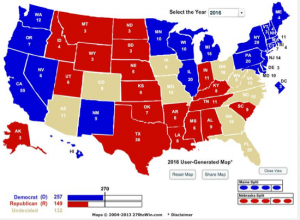Despite the midterm elections, the GOP isn’t enjoying a resurgence of popularity, nor has there been any realignment of American politics. This year’s results stemmed from low turnout, lousy campaigns, and the fact many Democrats elected in red states in the 2008 wave had to face reelection this year. Post-election polls show Republicans remain even less popular than Democrats.
The GOP faces a long-term structural problem. They’re a regional party with vote-pulling power only in the heartland and south, which is not where the majority of Americans live, work, and vote. The solid expanse of red states looks impressive on a map, but acres can’t vote. A single blue state, California, has as many presidential electoral votes as 12 red states together (AK, AR, ID, KS, MS, MT, ND, NE, OK, SD, UT, WY).
There are things Republicans can do to game control of Congress. For example, in 2012, they “won” a large House majority even though the Democratic candidates received 1.4 million more votes than the Republican candidates, thanks to gerrymandering by GOP-controlled state legislatures. In 2014, Republican House candidates in aggregate had over a 5 million vote margin, but turnout was only 72 million compared to nearly 118 million in 2012.
And the Electoral College is an entirely different story. Here, the GOP faces a solid blue wall in the Northeast, Upper Midwest, and West Coast, where the electoral votes are. Unless they can flip blue states — which they failed to do in 2008 or 2012 — the Democratic presidential candidate starts out with 257 of the 270 needed electoral votes. This means the Democrats need to win only 1 big or 2 medium sized swing states, without flipping a single red state. For the Republican candidate, that’s an almost insurmountable barrier.
GOP strategist Chris Ladd says the Nov. 4 elections were “a dark week for Republicans” despite their superficially crushing victory. Why? Because the GOP failed to broaden its appeal to a broader base of voters. In the long run, their base of white, rural, small-state voters won’t be enough to return them to power. And the GOP doesn’t seem to be getting smarter about this. Ladd believes his party is squandering its opportunity to lead in the new century by chasing “stupid” issues, and fears “our grandchildren will look back on our performance in much the same way that we see the failures of the generation that fought desegregation.”
Here are some of the omens he saw in this month’s elections:
Republican candidates lost every Senate race in the “Blue Wall.”
Half of the GOP’s House and Senate members now come from the former Confederacy, where not a single white Democrat remains in Congress.
Where Republicans won governorships, they lacked coattails.
Every major Democratic ballot initiative was successful, including minimum wage increases in four red states. Every Republican-backed “personhood” amendment lost.
Although Republicans won this election, they did it with only 17% of registered voters and 13% of those eligible to vote, and they won by playing on Obama’s unpopularity, not by promoting their party’s positions on issues.
Voter suppression has helped Republicans in some close races, but this won’t last, because Democrats are countering it by helping voters comply with voter ID laws, and meanwhile the GOP’s voter suppression efforts have alienated minority groups.
